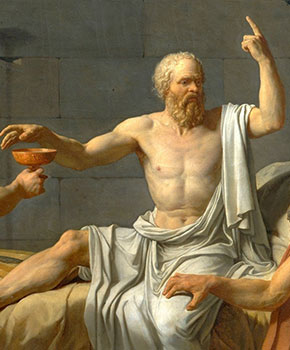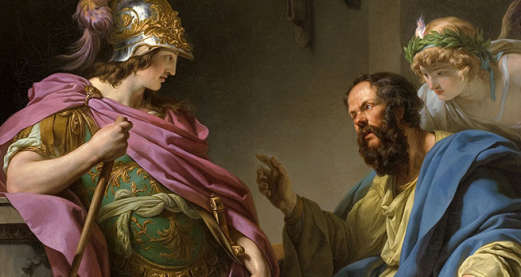 The Death of Socrates by Jacques-Louis David
In ancient Athens, individual behavior was maintained by a concept known as 'Eusebia' which is often translated into English as 'piety' but more closely resembles 'duty' or 'loyalty to a course'. In refusing to conform to the social propieties proscribed by Eusebia, Socrates angered many of the more important men of the city who could, rightly, accuse him of breaking the law by violating these customs.
The Death of Socrates by Jacques-Louis David
In ancient Athens, individual behavior was maintained by a concept known as 'Eusebia' which is often translated into English as 'piety' but more closely resembles 'duty' or 'loyalty to a course'. In refusing to conform to the social propieties proscribed by Eusebia, Socrates angered many of the more important men of the city who could, rightly, accuse him of breaking the law by violating these customs.
In 399 BCE Socrates was charged with impiety by Meletus the poet, Anytus the tanner, and Lycon the orator who sought the death penalty in the case. The accusation read:
“Socrates is guilty, firstly, of denying the gods recognized by the state and introducing new divinities, and, secondly, of corrupting the young.”
It has been suggested that this charge was both personally and politically motivated as Athens was trying to purge itself of those associated with the scourge of the Thirty Tyrants of Athens who had only recently been overthrown. Socrates' relationship to this regime was through his former student, Critias, who was considered to be among the worst of the tyrants and was thought to have been corrupted by Socrates. It has also been suggested, based in part on interpretations of Plato's dialogue of the Meno, that Anytus blamed Socrates for corrupting his son. Anytus, it seems, had been grooming his son for a life in politics until the boy became interested in Socrates' teachings and abandoned political pursuits. As Socrates' accusers had Critias as an example of how the philosopher corrupted youth, even if they never used that evidence in court, the precedent appears to have been known to the jury.
Ignoring the counsel of his friends and refusing the help of the gifted speechwriter Lysias, Socrates chose to defend himself in court. There were no lawyers in ancient Athens and, instead of a solicitor, one would hire a speechwriter. Lysias was among the most highly paid but, as he admired Socrates, he offered his services free of charge. The speechwriter usually presented the defendant as a good man who had been wronged by a false accusation, and this is the sort of defense the court would have expected from Socrates. Instead of the defense filled with self-justification and pleas for his life, however, Socrates defied the Athenian court, proclaiming his innocence and casting himself in the role of Athens' 'gadfly' - a benefactor to them all who, at his own expense, kept them awake and aware. When it came time for Socrates to suggest a penalty to be imposed rather than death, he suggested he should be maintained in honor with free meals in the Prytaneum, a place reserved for heroes of the Olympic games. This would have been considered a serious insult to the honor of the Prytaneum and that of the city of Athens. Accused criminals on trial for their life were expected to beg for the mercy of the court, not presume to heroic accolades.
Socrates was convicted and sentenced to death (Xenophon tells us that he wished for such an outcome and Plato's account of the trial in his Apology would seem to confirm this). The last days of Socrates are chronicled in Plato's Euthyphro, Apology, Crito and Phaedo, the last dialogue depicting the day of his death (by drinking hemlock) surrounded by his friends in his jail cell in Athens and, as Plato puts it, "Such was the end of our friend, a man, I think, who was the wisest and justest, and the best man I have ever known" (Phaedo, 118).
Socrates' influence was felt immediately in the actions of his disciples as they formed their own interpretations of his life, teachings, and death, and set about forming their own philosophical schools and writing about their experiences with their teacher. Of all these writings we have only the works of Plato, Xenophon, a comic image byAristophanes, and later works by Aristotle to tell us anything about Socrates' life. He, himself, wrote nothing, but his words and actions in the search for and defense of Truth changed the world and his example still inspires people today.
This article was originally published on Ancient.eu, written by Joshua J. Mark and released under the Creative Commons BY-NC-SA 3.0 licence.


Rate and Review
Rate this article
Review this article
Log into OpenLearn to leave reviews and join in the conversation.
Article reviews